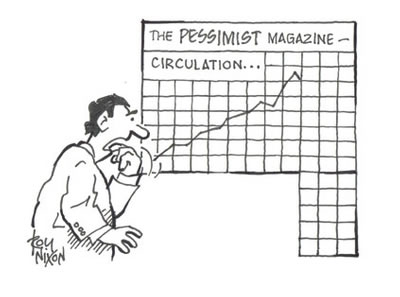
The belief that humanity makes moral progress depends upon a wilful ignorance of history. It also depends upon a wilful ignorance of oneself – a refusal to recognise the extent to which selfishness and calculation reside in the heart even of our most generous emotions, awaiting their chance. Those who invest their hopes in the moral improvement of humankind are therefore in a precarious position: at any moment the veil of illusion might be swept away, revealing the bare truth of the human condition. Either they defend themselves against this possibility with artful intellectual ploys, or they give way, in the moment of truth, to a paroxysm of disappointment and misanthropy. Both of these do violence to our nature. The first condemns us to the life of unreason; the second to the life of contempt. Human beings may not be as good as the shallow optimists pretend; but nor are they as bad as the prophets and curmudgeons have painted them.
In order to see human beings as they are, therefore, and to school oneself in the art of loving them, it is necessary to apply a dose of pessimism to all one’s plans and aspirations. I don’t go along with Schopenhauer’s comprehensive gloom, or with the philosophy of renunciation that he derived from it. I have no doubt that St Paul was right to recommend faith, hope and love (agape) as the virtues which order life to the greater good. But I have no doubt too that hope, detached from faith and untempered by the evidence of history, is a dangerous asset, and one that threatens not only those who embrace it, but all those within range of their illusions.
Pessimism is needed, not in order to neutralise the belief in human uniqueness, but in order to protect it. The disgusted dismissal of homo rapiens and all his works that we find spelled out by John Gray in Straw Dogs is not a form of pessimism. It is an attempt to dismiss humanity entirely, as a kind of plague on the face of the earth. That kind of misanthropic nihilism is of no use to us. It removes the ground from all our values, and puts nothing in their place. And it feeds on specious arguments designed to show that we are “merely” animals, distinguished in no significant respect from rats and worms, and with no right to the privileges that we have traditionally claimed, as moral beings who pursue the good.
I believe that we are significantly distinct from the other animals. For we are rational beings who relate to each other “I” to “I”. Freedom, individuality, accountability and the moral life all result from this. They are outgrowths of first-person knowledge, of the fact, as Kant put it, that we alone in the world say “I”. It is not because we are non-rational that we are subject to illusions and fallacies. On the contrary, it is because we are rational.
However, in a host of ways we make the life of reason easy for ourselves, by ploys and fallacies that feed our false hopes. In The Uses of Pessimism I explore some of these ploys and fallacies, and show the devastating effect they have had on modern societies. For example, there is the “born free” fallacy that has dominated educational thinking since Rousseau. This tells us that human freedom is a natural gift, that we are born to enjoy it, and that we lose it through the laws, rules and hierarchies of social life. That, in my view, is the opposite of the truth. Human freedom is an artefact. Societies have built laws, institutions and forms of collective discipline precisely in order that the individual can live freely. To believe that we are born free makes it easier to bear our frustrations, to blame others for our woes, and to dignify our inadequacies with the colours of a justified rebellion. It enables us to discard all knowledge that it is painful to acquire, and to believe that idleness is virtue. And the effect of this belief on education has been devastating, leading everywhere to the loss of discipline and culture.
Equally devastating in my view has been the “zero sum” fallacy, the belief that every benefit received by one person is a loss felt by another. If John is rich it is because Mary is poor. If one part of the world is flourishing it is because some other part is declining. According to the zero sum fallacy all good things must be paid for, and the art of society is to pass the cost to someone else. That fallacy underlies Marx’s theory of surplus value; it inspired the revolutions conducted in Marx’s name, and gave resentment a scientific face. In fact, however, social cooperation is not a zero sum game, and the art of society is to discover the ways in which one person’s good is a good for the rest of us.
Such fallacies have led to disastrous results on account of the false hopes that are built on them. Many of these false hopes have fizzled out. But there is truth in the view that hope springs eternal in the human breast, and false hope is no exception. In the world that we are now entering there is a striking new source of false hope, in the “trans-humanism” of people like Ray Kurzweil, Max More and their followers. The transhumanists believe that we will replace ourselves with immortal cyborgs, who will emerge from the discarded shell of humanity like the blessed souls from the grave in some medieval Last Judgement.
The transhumanists don’t worry about Huxley’s Brave New World: they don’t believe that the old-fashioned virtues and emotions lamented by Huxley have much of a future in any case. The important thing, they tell us, is the promise of increasing power, increasing scope, increasing ability to vanquish the long-term enemies of mankind, such as disease, ageing, incapacity and death.
But to whom are they addressing their argument? If it is addressed to you and me, why should we consider it? Why should we be working for a future in which creatures like us won’t exist, and in which human happiness as we know it will no longer be obtainable? And are those things that spilled from Pandora’s box really our enemies – greater enemies, that is, than the false hope that wars with them? We rational beings depend for our fulfilment upon love and friendship. Our happiness is of a piece with our freedom, and cannot be separated from the constraints that make freedom possible – real, concrete freedom, as opposed to the abstract freedom of the utopians. Everything deep in us depends upon our mortal condition, and while we can solve our problems and live in peace with our neighbours we can do so only through compromise and sacrifice. We are not, and cannot be, the kind of posthuman cyborgs that rejoice in eternal life, if life it is. We are led by love, friendship and desire; by tenderness for young life and reverence for old. We live, or ought to live, by the rule of forgiveness, in a world where hurts are acknowledged and faults confessed to. All our reasoning is predicated upon those basic conditions, and one of the most important uses of pessimism is to warn us against destroying them. The soul-less optimism of the transhumanists reminds us that we should be gloomy, since our happiness depends on it.
The Uses of Pessimism and the Danger of False Hope is published by Atlantic in June

